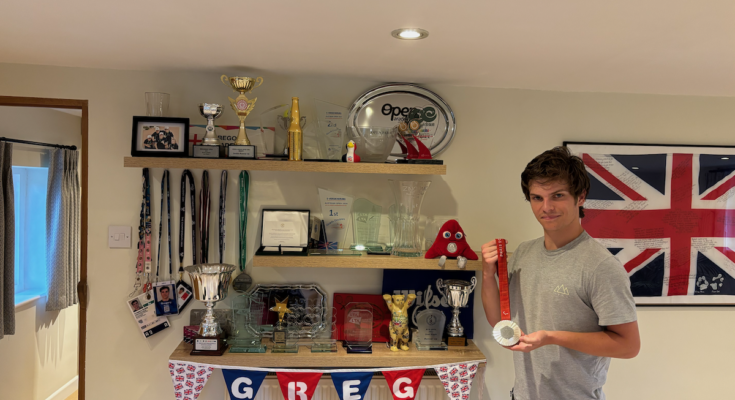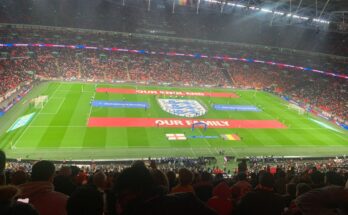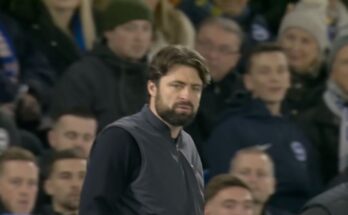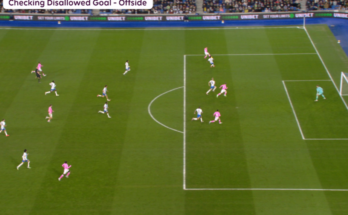‘NEW balls please’ took on a whole new meaning for Greg Slade when naked Novak let it all “hang out” in his eye-line.
Debutant wheelchair tennis player Slade was thrusted into the life of Australian Grand Slam tennis in an eyeballing fashion, wheeling in at the wrong time to see Novak Djokovic prove his number one status.
The 22-year-old — suddenly feeling a lot hotter in sunny Melbourne — was not used to sharing changing rooms with able-bodied players and received the warmest welcome from the world number one in a unique manner.
“They’re all so tall and I go into the changing rooms in my wheelchair and, it’s in your eye-line. It’s just like, woah!
“The able-bodied tennis players just have a weird thing about modesty because honestly they just let it all hang out and that is slightly weird, but I guess you get used to it.”
It was safe to say Slade wasn’t quite expecting such unusual hospitality from naked Novak, with the Australian Open being the only Grand Slam competition to integrate able-bodied players with wheelchair athletes.
Such unprecedented integration at the Open added to the surreality of the competition, where Slade recalls being in a state of shock at the access he had to the greats he had watched growing up.
“I was eating with my coach in a player’s area at the top of the Rod Laver Arena, and we could see a crowd forming down in the public areas underneath us. They were all shouting and screaming for Djokovic, who was leaning over and waving at them. I turned to my coach and said, ‘people would kill for this kind of access that we have to him right now’.”
Slade didn’t kill for the access, but he worked his socks off for it.
Born with Cerebral Palsy, many would assume Slade’s disability would restrict his movement to his wheelchair, but that is not how this story goes.
Able to move independently on his feet, Slade’s earliest memories of playing tennis span back to the age of seven.
“I had always hit on my feet with my family who are also keen tennis players. Whether that’s over a mini net in the garden or on holiday, we’d always play. I knew how to hit a ball, I had good hand-eye co-ordination, but it was just getting around the court that was quite tough.
“Compared to some people, I’m quite disabled, but to others, I’m very much able. Being in the middle of that spectrum is a weird one because I’m still quite independent.
“I was the only student at the school with a physical disability in the entirety of my time there.
“My family have been supportive and they’ve helped to minimise the impact of my disability and allow me to do as much as I can, but you have to grow up in a world that isn’t built for you.”
Once Slade had turned 14, his parents drove him to Sutton Training Academy — four miles south of Wimbledon — so he could try his hand at wheelchair tennis once a fortnight.
Little did Slade know that he would make his Grand Slam debut just four miles away from where he fell in love for the sport, with Sutton Academy coach Luke by his side every step of the way.
The obstacles refused to shy away for the then 14-year-old, who enjoyed playing recreational tennis in a wheelchair for the first time, embracing the barriers and challenges along the way.
“Getting into a chair made my disability so obvious. I had to be okay with being visibly disabled for the first time, which was a big thing for me.
“There is still that societal thing about people in wheelchairs, and the automatic assumption that they cannot walk at all and perhaps, I was afraid of people assuming I was more disabled than I actually am.
“At an event in Nottingham, I remember some ball kids approaching the organisers and informing them that a disabled player had gotten up and walked off out of their chair after a match. They had to explain that not all disabilities are the same and that you have to have a permanent disability.
“But I soon realised that it’s not about disability. It’s about playing sport and that sport transcends any form of disability.”
Initially interested in a career in diplomacy — invigorated from work experience with MP Anne Milton in her office at the Houses of Parliament — Slade has instead applied his learnings from this experience into full-time tennis.
“The work experience was really fun. I have always been politically inclined as I find it very interesting, and if I was not playing tennis I would have gone into some political line of work. I am still a bit of a junkie when it comes to politics.
“Having drawn on my political knowledge and experience from those few days, it is important to know how to have a conversation, how to be civil and diplomatic, and how to find an agreement after negotiating and getting your point across when you need to.
“There is a lot of politics involved in sport. Whether that is the governing body of the sport, the LTA or internationally with the ITF.
“Throughout my career I have had a lot of conversations, and there has been a lot of hoops to jump through as there is always something going on.”
Transferring the diplomatic skills from his work experience into the world of tennis, Slade believes there is much work to be done by the sport governing bodies of wheelchair tennis.
“The quad division is specifically for players with sufficient upper body impairment and, while the LTA do as best as they can to put quad tennis on an equal footing to open divisions, there is work to be done.
“Roughly a third of competitions on the tour do not have quad wheelchair players competing, so organisations such as the ITF need to understand that actually, the quad category deserves to be at all of these events.”
Slade reflected on being forced to withstand battles regarding his own classification with the ITF, resulting in being sidelined from competing for a year and a half, leaving him unsure about pursuing the sport he loved.
Narrowly missing out on eligibility for quad competitions — scoring 11 out of a possible 14 when needing ten points or under — tested Slade’s resolve and resilience to the fullest through a difficult spell on the sidelines while protesting against the ITF for a re-classification.
“My journey has been a rocky one. I missed my classification the first time around. Once the LTA and doctors far more knowledgeable than me expressed shock at the result, I was encouraged to protest the result. It was a whole saga which eventually resulted in eligibility for a re-classification which later qualified me for quad competitions.
“I think that sums up the issues with the classification system, in that it can totally depend on who is doing the classification due to it being subjective. The rules need to be changed in how much time people have to collate evidence.
“It was an incredibly difficult time for me. I was still unsure about whether tennis was something I wanted to do. The uncertainty of whether or not I could do it was horrible as the length of time it took between my first and second classification test was nearly a year and a half, and this was pre-COVID so they simply had no excuse.
“I could have been playing on tour a lot more, gaining some senior experience but I missed out. It was very detrimental for me having that uncertainty looming over me generally for my mental health. It was always there in the background along with everything else that goes on in life with other stresses.”
Once cleared to compete in the quad divisions, Slade was back into action ascending up the GB and world rankings, competing across the world aiming to solidify a place in his first Grand Slam competition, before a wrist injury at a tournament in Eastbourne set Slade back for five months, leaving little time to recover before a possible appearance at Wimbledon in 2023.
“I remember it was really tough being out for five months because I was at home doing nothing other than just rehabilitating but watching your rank slowly drop due to not playing.
“For me, I’ve found it important to just focus on one day at a time otherwise if I do not micromanage it in that way I find things can get overwhelming.”
Free from the shackles of injury setbacks, Slade returned to action in time for Wimbledon and trained at the National Tennis Centre, ahead of a possible inclusion in the summer where he would occasionally bump into Maria Sharapova, Jack Draper, and former tennis player Jérémy Chardy.
“Back in 2018, a group of us were hitting while Jérémy Chardy was training at the NTC and he came in to hit with us. We all got photos with him and videos of us hitting with him. Experiencing moments like that at such a young age, way before I decided that tennis was what I wanted to do was incredible.
“Another fun encounter I had was encouraging Jack Draper to get into a wheelchair and try and hit like we do. It was really great fun observing how terrible he was and watching how they struggle, but it really drove home to them what we do and it is important to help them gain a better understanding of wheelchair tennis.
“The strokes of hitting the ball are the same, but once you add in the impact of the movement in chairs it is so foreign to them. They find it so different and difficult to wrap their heads around at first that sometimes everything goes out the window.”
Slade was awarded a spot at Wimbledon as a wildcard in 2023, making his first appearance at a Grand Slam competition. Describing the experience at the time as, ‘the best few days of his life’ he partnered with wheelchair tennis legend David Wagner, but were beaten in the doubles semi-finals while Slade exited the singles in the quarter-finals.
Slade has become well-versed on the big stage at Grand Slam competitions, including his recent participation in the Australian Open in January, the stage where his infamous encounter with Novak Djokovic left him wondering how he found himself in these types of scenarios.
“If I could go back and tell 13, 14-year-old me that this is where this is going to take you, I’d laugh in my own face.”
Slade returned from the Paris 2024 Paralympic Games as a silver medalist — having partnered with veteran Andy Lapthorne — and admitted he is still processing life as a Paralympic athlete months after the successful tournament.
“I’m still processing it all. The Paralympics in para-sport is the be all and end all so there is a huge amount of build up to the event. Andy and I had been preparing for the Paralympics for a number of years and were earmarked as the team for Paris pretty quickly after Tokyo.
“I felt like the new kid on the block going into the Paralympics but Andy, who is very successful and experienced in his own right, made me feel very comfortable.”
Defeating Ymanitu Silva and Leandro Pena in the Paralympic Quad Doubles semi-final proved tricky for Team GB when they were 4-1 up in the second set, but fell 5-4 down to the Brazilians mounting a comeback by targeting the inexperience of Slade.
“As the lower ranked player out of the pair of us and being less experienced, I knew that I was going to be targeted. I had to really focus on my role in the double pairing and not try to play ‘lights out’ tennis and instead put the other team under pressure. In those tight moments I just had to trust myself and trust Andy.”
Thankfully for Slade and Lapthorne, Team GB prevailed on the grand stage of the Roland-Garros and an almighty roar of approval from the GB supporters echoed while Slade — upon confirmation of a guaranteed silver or gold medal — burst into floods of tears and wheeled straight over to celebrate with his family.
“I firstly cried my eyes out because I was utterly relieved. The fact the medal was guaranteed was a really nice feeling and to be able to immediately share that with family and friends, but also the coaching team and everybody that had had a big impact was so nice.
“My first reaction when the medal was hung around my neck was ‘God it’s heavy!’. It was very surreal and a really nice moment to look down at the medal and say to yourself, ‘I’ve earned this’.”
Post-Paralympics, Slade continues to maintain his rank as 2nd for GB in singles and doubles, and is determined to secure a more frequent spot on the big stage.
“For me, my goal now is to solidify a spot in the Grand Slams. To put it bluntly, that’s where people earn the income. I love living at home but eventually there’s a time where I’d like to go and live somewhere else and playing at Grand Slams would enable me to do that.
“I’d love to go and play in LA in 2028. Paris was amazing, so I’m going to keep trying my best and we’ll see where that leads me.”
With his eyes firmly set on the Grand Slams to come, Slade will be hoping not to see a sudden change of balls more frequently than every nine games.



